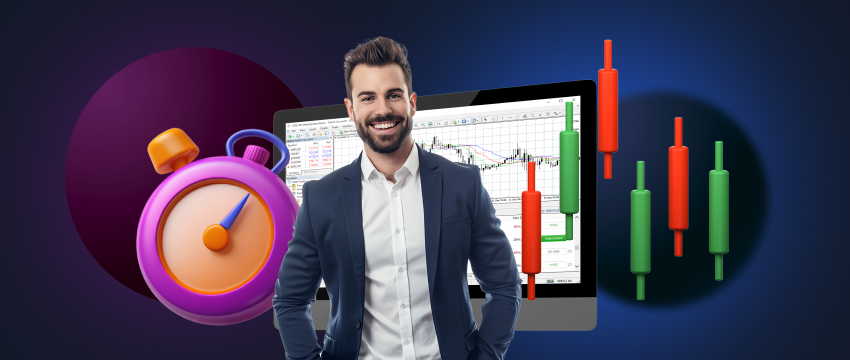Many traders aim to maximize success. They often wait for the right time to enter or exit positions. This strategy is common among Market Timer traders. They rely on a mix of 기술적 분석, fundamental analysis, quantitative models, or economic data to inform their trading decisions.
However, Charles Schwab offers a different perspective. In his article Does Market Timing Work, he questions this approach. Schwab suggests market timing could lead to more losses than gains. His research highlights a key finding. “The cost of waiting for the perfect moment to invest typically exceeds the benefit of even perfect timing.”
And because timing the market perfectly is nearly impossible, the best strategy for most of us is not to try to market-time at all. Instead, make a plan and invest as soon as possible.”
But what is market timing precisely and how is it used in trading?
Market timing involves making the decision to buy or sell an asset by first predicting whether the market will go up (peak) or go down (trough). The objective is to time a trade for maximum gains.
But market timing as a trading strategy is somewhat controversial. Some argue that it offers no real potential for profit while others strongly believe in its efficacy. This leaves the question of who is right open for debate.
Findings by William Sharpe in his 1975 study Likely Gains From Market Timing published in the Financial Analyst Journal highlighted how the “market timing approach would need to be correct 74% of the time in order to outperform a comparable benchmark portfolio on an annual basis.”
If Sharpe’s findings are true, then it’s clear that while market timing does offer opportunities, it does not guarantee success. It requires a high level of accuracy and skill to be effective, complimented by significant time commitment, and a willingness to take on considerable risk.

Traits of market timing traders
Marketing timing traders possess robust analytical capabilities for conducting technical and fundamental analysis. They possess a sharp eye for detail. They consistently monitor markets to spot small price movements. These movements could impact their trades. They have a high tolerance for market volatility.
They remain disciplined and patient under pressure. This helps them avoid impulsive decisions and manage risk effectively. Market timing traders work towards building a strong trading psychology to avoid letting their feelings drive financial decision making. Also they strive to be flexible to be able to respond quickly to rapidly shifting market conditions.
A prudent approach to market timing
For those looking to adopt the market timing strategy, risk management is key.
There are many risk management techniques to consider:
Position sizing:
- If you’re implementing market timing for the first time, start small. Commit a lesser amount of your funds to trades. This helps avoid losing large sums of money.
- Gain experience in executing this form of trading. Gradually increase your investment capital as you become more skilled.
- In addition, position sizing is a vital risk management technique. Especially for beginner traders who are still finding their feet in the financial markets.
Trading related education:
- Ensure you learn as much as you can about 기술적 지표. So that you can conduct technical analysis, a core component of all trading.
- Commit time daily to trading-related education. While not a direct risk management technique, it helps inform your trading decisions.
- And this will go a long way in helping you protect your money. Knowledge can be acquired in many ways. This includes blogs, podcasts, webinars, podcasts, e-books, videos, trading courses, seminars, and more.
- Resources like these are plentiful, and can be accessed all across the internet, YouTube, and probably even via your broker.
Trading psychology:
- Emotions are incredibly powerful. They can influence decision making, often in the most negative ways. And this often leads to adverse trading outcomes.
- Knowing how to manage your feelings to avoid them driving your trading decisions is crucial. Building a strong trading psychology means learning how to become mentally resilient.
- It means not allowing feelings like fear, greed, arrogance, or stress to overwhelm you to the point that you are unable to reason properly.
- There are many ways to achieve this, like engaging in mindfulness practices, educating yourself to the point that you feel confident in your knowledge. Also, ensuring that you make decisions based on objective analysis rather than knee-jerk reactions.

Setting stop–loss and take-profit orders
- Probably two of the most popular risk management techniques, these orders seek to limit loss and lock in profits.
- They are both triggered when predefined thresholds are met, ensuring that trades are executed to avoid you either losing too much money or locking in gains.
Limit exposure to volatility
- Market timing generally involves trading in volatile markets. If you are new to trading and likely not skilled enough to handle the challenges of volatile markets, consider avoiding trades in these market conditions.
- Alternatively, opt for reduced position sizing so as to safeguard your funds.
Portfolio diversification
- Consider spreading your capital across different asset classes or industries.
- By not investing all your money in one industry or financial instrument cushions the loss incurred from poor timing in one trade with profits earned in another.
Joining online community forums.
- As in the case of acquiring a trading related education, joining forums to engage with your peers is a great way to acquire new tips, insights, and ideas.
- There exist millions of traders all across the world and shared experiences or exchange of information is a great way to learn new things, helping you to become a more skilled market timer trader.
Keep a trading journal
- By recording your trades and the rationale behind each one is a great way to build a historical record.
- Data like this is super helpful as it gives you a way to look back at past trading decisions and behaviours that you exhibited, allowing you to make changes where necessary.
Register for a demo trading account
- Another great way to gain practical trading experience is by signing up for a demo trading account and putting your market timing strategy into practice.
- Additionally, this allows you to refine your skills and gain confidence without risking real capital. Moreover, demo accounts offer a valuable opportunity to test different strategies in real-time market conditions.
- As a result, you can make adjustments based on your experiences and improve your overall trading approach.
- With access to a simulated trading environment and real life market conditions, you can execute trades using virtual money and assess outcomes.
- As you build in confidence and expertise, you’ll also have the peace of mind that your own money won’t be at risk.
- As you eventually move over to live trading, you can continue using your demo account to test out newer, perhaps more complex strategies, and gauge outcomes.
- In this way, your funds remain protected, and you have a better idea of what will potentially work or won’t work.

Discover a world of Forex trading at T4Trade
T4Trade is an online broker serving its clients from all over the world. Besides, it has excellent multilingual support 24/5, advanced trading platforms, and highly flexible conditions of trading. If you want to enrich your knowledge in the sphere of forex trading, T4Trade provides you with substantial educational materials.
These range from videos, podcasts, and ebooks to webinars and on-demand content developed by in-house experts for traders of all experience levels.
T4Trade provides its clients with a wide variety of instruments to trade in six asset classes. In addition, the 거래 플랫폼 gives its clients competitive spreads, flexible leverage, swift trade executions, as well as simple deposit and withdrawal methods. Moreover, the account types that can be chosen by traders are varied.
Disclaimer: This material is for general informational and educational purposes only and should not be considered investment advice or an investment recommendation. T4Trade is not responsible for any data provided by third parties referenced or hyperlinked in this communication.




